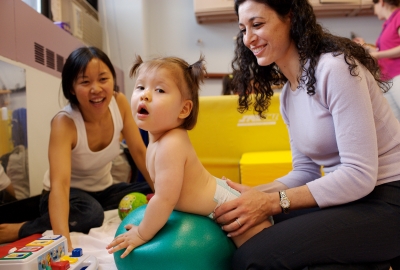
Fieldwork
As an EL-OTD student, you will complete three part-time Level I Fieldwork experiences and two full-time Level II Fieldwork experiences which provide an opportunity to connect academic learning with clinical practice through directed observation and participation in aspects of the occupational therapy process.
Our department has relationships with more than 200 hospitals, outpatient centers, rehabilitation facilities, community organizations, schools, and private practices in New York City and throughout the country, where you can grow and develop as an occupational therapist in real-world contexts.
Level I Fieldwork
You will begin your clinical fieldwork rotations in the Fall semester of the 2nd year. There are three Level I Fieldwork experiences: two in the Fall and one during the Spring. In these rotations, you will have the opportunity to work with a variety of populations in many settings. The purpose is to have students connect their academic learning with clinical practice through directed observation and participation in selected aspects of the occupational therapy process.
Level II Fieldwork
Upon completion of all coursework, you will participate in two full-time Level II Fieldwork experiences, where you will be supervised by an occupational therapist. Your direct supervisor(s) will assign you a caseload of patients and clients, and you will be expected to demonstrate progressively higher levels of performance and responsibility as you proceed and gain experience. Level II Fieldwork is designed to develop competent, entry-level generalist practitioners. Your OT supervisor(s) will assess your work.
Fieldwork Courses
- OT-GE 2721 Level I Fieldwork- Experience 1 (1 credit)
- OT-GE 2722 Level I Fieldwork- Experience 2 (1 credit)
- OT-GE 2703 Level II Fieldwork in Occupational Therapy - Experience 1 (12 weeks: 3 credits)
- OT-GE 2803 Level II Fieldwork in Occupational Therapy - Experience 2 (12 weeks: 3 credits)
Level II Fieldwork in Occupational Therapy, Experiences 1 & 2, 6 credits
Students will participate in supervised full-time practice in various agencies and institutions. Students will gain and apply knowledge in a variety of practice settings treating clients and patients across the lifespan. Students will be assigned caseloads consisting of patients/clients with whom they are expected to demonstrate progressively higher levels of performance and responsibility as fieldwork advances. Department faculty consult with individual sites to assist in the development of their fieldwork programs and the supervision of our students. Students must show initiative and respond appropriately to supervision. Students must demonstrate ethical professional behavior. Students should demonstrate entry-level skills with the population to whom they have been assigned.
Doctoral Capstone
The degree places a strong emphasis on evidence-based practice and applied research and requires a doctoral capstone as an integral part of the program’s curriculum design. The goal of the doctoral capstone is to provide in-depth exposure to a specific area of interest and prepare students with more advanced knowledge and skills in an area of leadership, scholarship, advocacy, and clinical competence. The doctoral capstone consists of a capstone project and experience. During the doctoral capstone, students will work with a faculty and site mentor to apply the knowledge and skills developed in courses and during fieldwork to design, implement, and disseminate an innovative response to an identified practice or professional need.
Capstone Courses
Doctoral Capstone Experience, 3 credits
The doctoral capstone is an in-depth experience designed to facilitate the development of advanced knowledge and skills in a concentrated area for a minimum of 14 weeks (560 hours). This in-depth experience may be in one or more of the following areas: clinical practice, research, scholarship, administration, leadership, program and policy development, advocacy, education, and theory development. Students will participate in full-time supervised practice in an agency or institution. The doctoral capstone experience includes the initiation and completion of a capstone project.
Capstone I: Needs Assessment in Healthcare and Community Practice, 2 credits
In this course students will gain knowledge and skills in conducting a needs assessment. The course will build on prior foundational coursework related to critical reflection, research methods, literature review, evidence-based practice, gathering and analyzing data, and report writing. Students will begin to collaborate with their capstone site mentor and will plan and conduct a needs assessment that is relevant to their capstone experience.
Capstone II: Program Development and Evaluation, 2 credits
This course introduces principles of program development and evaluation to prepare students for designing their capstone project. Emphasis will be on students’ understanding and implementation of concepts and skills necessary for effective program design, implementation, maintenance, and evaluation.
Capstone III: Doctoral Capstone Proposal, 2 credits
Course focuses on the development of the OTD capstone project proposal. Emphasis is placed on understanding and defining the relationship between elements in a scholarly proposal including the problem statement supported by the needs assessment, literature review, methodology, and knowledge translation (KT) sections. Students will develop culturally and contextually appropriate KT products, based on the needs of multiple stakeholders to disseminate knowledge gained from their Capstone project and facilitate uptake of their work.
Capstone IV: Doctoral Capstone Project, 2 credit
The focus of the course is to guide students’ implementation and completion of their doctoral capstone project while on the Doctoral Capstone Experience (DCE). The doctoral capstone coordinator (DCC) will deliver lectures, and serve as a resource and consultant to students, faculty and capstone mentors. The faculty mentor serves as a resource and consultant to the student on the doctoral capstone proposal that was developed in previous courses. Students will complete a final capstone report and disseminate outcomes of their capstone project at the end of the course.
Out-of-State Fieldwork & Capstone Experiences
If an enrolled student is requesting to complete any fieldwork or capstone experience outside of New York State, authorization within the specific state may be required prior to completion of the educational activity. Please read NYU’s Non-NY State Authorization and Distance Education page on the University’s website if you are considering having a fieldwork or capstone experience outside of New York State for a current chart summary of the non-classroom experience restrictions for NYU and additional details.
